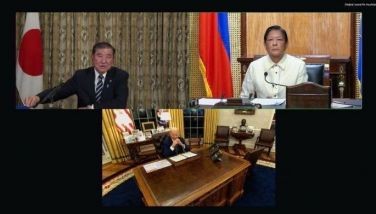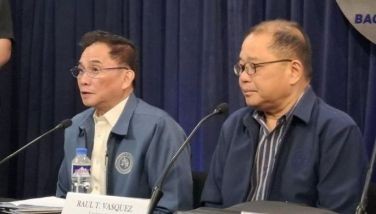Seven Pinoys sent back by New Zealand for lack of travel plans
June 4, 2006 | 12:00am
For the second time, a group of Filipinos was denied entry into New Zealand by immigration officials because of "misrepresentation," an embassy report said.
The seven Filipinos arrived at the Auckland airport last Wednesday but were returned to the Philippines on the next available flight.
Agents of the New Zealand Immigration Service (NZIZ) doubted their purpose of travel because they had no confirmed itineraries and accommodations during their visit.
To avoid this kind of incident, the Department of Foreign Affairs (DFA) once again reminded Filipino tourists to make sure they have confirmed itineraries and accommodations before traveling to New Zealand.
Chargé d’Affaires Lolita Capco of the Philippine Embassy in Wellington, New Zealand said in a report to the DFA that this was the second time Filipinos had been refused entry to New Zealand.
Last January, two Filipinos were immediately sent home due to "doubtful bona fides and false declaration of reason for coming to New Zealand."
"The embassy has gathered that in both cases, certain travel and immigration consultants in Manila had lured these Filipinos who were hoping to work in New Zealand to come first as tourists. These agents had made false claims that arrangements were being made for them to take up work eventually," Capco said.
"The Philippine Embassy urges would-be Filipino migrants to New Zealand to go through proper channels and procedures. The Embassy likewise reminds Filipino migrants in New Zealand not to aid illegal migrants to avoid the severe penalties of the country’s strict immigration laws," she added.
Capco explained that New Zealand’s Crimes Act 2002 (against People Smuggling) provides for harsh punishment to deter unscrupulous New Zealanders from helping illegal migrants to work in their country. The Act also imposes heavy fines and jail terms for people who would employ those without proper work permits.
She said that the Security Group Manager of New Zealand’s Department of Labour, who is actively prosecuting perpetrators emphasized that the heavy sentences for violators of the act prove that "the government regarded people smuggling very seriously." — Pia Lee-Brago
The seven Filipinos arrived at the Auckland airport last Wednesday but were returned to the Philippines on the next available flight.
Agents of the New Zealand Immigration Service (NZIZ) doubted their purpose of travel because they had no confirmed itineraries and accommodations during their visit.
To avoid this kind of incident, the Department of Foreign Affairs (DFA) once again reminded Filipino tourists to make sure they have confirmed itineraries and accommodations before traveling to New Zealand.
Chargé d’Affaires Lolita Capco of the Philippine Embassy in Wellington, New Zealand said in a report to the DFA that this was the second time Filipinos had been refused entry to New Zealand.
Last January, two Filipinos were immediately sent home due to "doubtful bona fides and false declaration of reason for coming to New Zealand."
"The embassy has gathered that in both cases, certain travel and immigration consultants in Manila had lured these Filipinos who were hoping to work in New Zealand to come first as tourists. These agents had made false claims that arrangements were being made for them to take up work eventually," Capco said.
"The Philippine Embassy urges would-be Filipino migrants to New Zealand to go through proper channels and procedures. The Embassy likewise reminds Filipino migrants in New Zealand not to aid illegal migrants to avoid the severe penalties of the country’s strict immigration laws," she added.
Capco explained that New Zealand’s Crimes Act 2002 (against People Smuggling) provides for harsh punishment to deter unscrupulous New Zealanders from helping illegal migrants to work in their country. The Act also imposes heavy fines and jail terms for people who would employ those without proper work permits.
She said that the Security Group Manager of New Zealand’s Department of Labour, who is actively prosecuting perpetrators emphasized that the heavy sentences for violators of the act prove that "the government regarded people smuggling very seriously." — Pia Lee-Brago
BrandSpace Articles
<
>
- Latest
- Trending
Trending
Latest
Trending
Latest
Recommended































